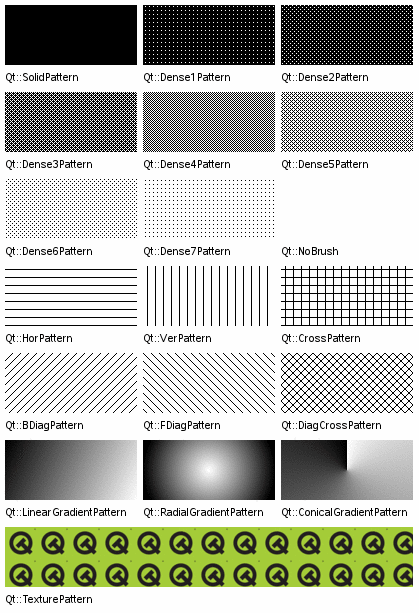pub struct BrushStyle(/* private fields */);Expand description
This enum type defines the brush styles supported by Qt, i.e. the fill pattern of shapes drawn using QPainter.
C++ enum: Qt::BrushStyle.
Implementations§
Source§impl BrushStyle
impl BrushStyle
Sourcepub const NoBrush: BrushStyle
pub const NoBrush: BrushStyle
No brush pattern. (C++ enum variant: NoBrush = 0)
Sourcepub const SolidPattern: BrushStyle
pub const SolidPattern: BrushStyle
Uniform color. (C++ enum variant: SolidPattern = 1)
Sourcepub const Dense1Pattern: BrushStyle
pub const Dense1Pattern: BrushStyle
Extremely dense brush pattern. (C++ enum variant: Dense1Pattern = 2)
Sourcepub const Dense2Pattern: BrushStyle
pub const Dense2Pattern: BrushStyle
Very dense brush pattern. (C++ enum variant: Dense2Pattern = 3)
Sourcepub const Dense3Pattern: BrushStyle
pub const Dense3Pattern: BrushStyle
Somewhat dense brush pattern. (C++ enum variant: Dense3Pattern = 4)
Sourcepub const Dense4Pattern: BrushStyle
pub const Dense4Pattern: BrushStyle
Half dense brush pattern. (C++ enum variant: Dense4Pattern = 5)
Sourcepub const Dense5Pattern: BrushStyle
pub const Dense5Pattern: BrushStyle
Somewhat sparse brush pattern. (C++ enum variant: Dense5Pattern = 6)
Sourcepub const Dense6Pattern: BrushStyle
pub const Dense6Pattern: BrushStyle
Very sparse brush pattern. (C++ enum variant: Dense6Pattern = 7)
Sourcepub const Dense7Pattern: BrushStyle
pub const Dense7Pattern: BrushStyle
Extremely sparse brush pattern. (C++ enum variant: Dense7Pattern = 8)
Sourcepub const HorPattern: BrushStyle
pub const HorPattern: BrushStyle
Horizontal lines. (C++ enum variant: HorPattern = 9)
Sourcepub const VerPattern: BrushStyle
pub const VerPattern: BrushStyle
Vertical lines. (C++ enum variant: VerPattern = 10)
Sourcepub const CrossPattern: BrushStyle
pub const CrossPattern: BrushStyle
Crossing horizontal and vertical lines. (C++ enum variant: CrossPattern = 11)
Sourcepub const BDiagPattern: BrushStyle
pub const BDiagPattern: BrushStyle
Backward diagonal lines. (C++ enum variant: BDiagPattern = 12)
Sourcepub const FDiagPattern: BrushStyle
pub const FDiagPattern: BrushStyle
Forward diagonal lines. (C++ enum variant: FDiagPattern = 13)
Sourcepub const DiagCrossPattern: BrushStyle
pub const DiagCrossPattern: BrushStyle
Crossing diagonal lines. (C++ enum variant: DiagCrossPattern = 14)
Sourcepub const LinearGradientPattern: BrushStyle
pub const LinearGradientPattern: BrushStyle
Linear gradient (set using a dedicated QBrush constructor). (C++ enum variant: LinearGradientPattern = 15)
Sourcepub const RadialGradientPattern: BrushStyle
pub const RadialGradientPattern: BrushStyle
Radial gradient (set using a dedicated QBrush constructor). (C++ enum variant: RadialGradientPattern = 16)
Sourcepub const ConicalGradientPattern: BrushStyle
pub const ConicalGradientPattern: BrushStyle
Conical gradient (set using a dedicated QBrush constructor). (C++ enum variant: ConicalGradientPattern = 17)
Sourcepub const TexturePattern: BrushStyle
pub const TexturePattern: BrushStyle
Custom pattern (see QBrush::setTexture()). (C++ enum variant: TexturePattern = 24)
Trait Implementations§
Source§impl Clone for BrushStyle
impl Clone for BrushStyle
Source§fn clone(&self) -> BrushStyle
fn clone(&self) -> BrushStyle
1.0.0 · Source§fn clone_from(&mut self, source: &Self)
fn clone_from(&mut self, source: &Self)
source. Read more